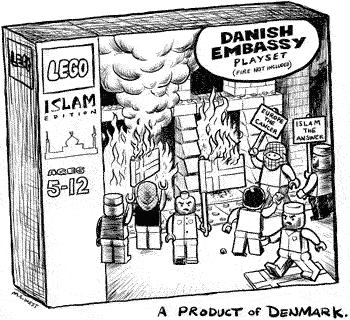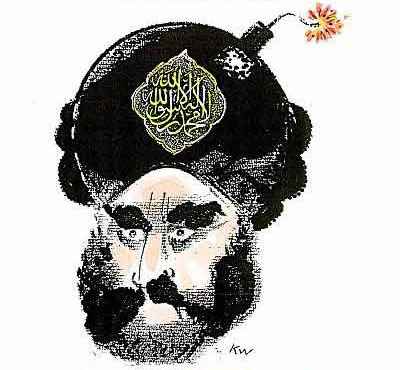Nearly all cartoonists worth their salt have enraged some portion of their readership, often when religious symbolism was part of the cartoon... This said, readers should know that cartoonists working for mainstream American newspapers--and there are more than 80 around the country--generally try to avoid negatively caricaturing any group just to make fun of them.
Signe Wilkinson, Pulitzer prize winning cartoonist with the
Philadelphia Daily
It can be argued that the editor of
Jyllands Posten committed an error in judgement in publishing cartoons of the Prophet. But let us leave that aside for a moment and examine what a cartoon sets out to do in the first place.
An editorial cartoon, also known as a political cartoon, is an illustration or comic strip containing a political or social message, says
Wikipedia . Most editorial cartoons use visual metaphors and caricatures to explain complicated political situtations, and thus sum up a current event with a humorous picture.
Cartoonist Wilkinson notes,
"The (Danish) cartoons were criticizing violence and suicide bombing in the name of Islam."
That, I thought was a reality and cartoonists had every right to touch upon the subject. However, I do think using the metaphor of Mohammed was avoidable.
In a well reasoned article
Hesham A. Hassaballa argued,
"These caricatures of the Prophet were akin to publishing a cartoon of Jesus Christ as a Catholic priest being dragged away in handcuffs for sexually abusing a young boy. Christ is wholly innocent of the crimes committed by a minority of Catholic priests against young boys…”
However, he added,
"The Muslim reaction went way too far. Most definitely Muslims had a right to protest …but to torch a Danish embassy (Syria), throw eggs at a Danish embassy (Indonesia), take over a European Union office at gunpoint (Gaza), and even beat two employees of the Danish company Arla Foods (Saudi Arabia) was completely unnecessary and--dare I say it--barbaric".
Or,
‘self prophetic’ as this cartoon puts it – brilliantly.

I quite liked this one too.
But no,
‘judgement’ prevailed and we went with
Brad and
Angelina (I mean the Indian version –
Abhishek and
Aishwarya).
I think a cartoon commenting on the extreme reaction to the cartoons is definitely within the ambit of free speech. But given our country’s peculiar brand of
‘secularism’, even that is not a good idea…

You can see a bunch of brilliant ones - like this one - here.
Daryl Cagle has a great blog running on the issue as well, from a unique point of view. That of the professional cartoonist.
And now, some serious observations.
Hesham Hassaballa observed,
"While I think it was wrong for the Morgenavisen Jyllands-Posten to publish those cartoons, it cannot be denied that newspapers in Arab and Muslim countries have published cartoons that were offensive to non-Muslims, especially Jews."
This is an important point. In fact, let’s look at the issue more deeply. Muslims enjoy the right to practise their religion in democratic societies such as Europe, USA or India. But wherever they are in a majority, people of other faiths must abide by their rules. And these rules have a religious basis.
And this extends to an extreme level, as this news report makes clear:
Saudi Arabia police razes makeshift Hindu temple. RIYADH: Saudi religious police have destroyed a clandestine makeshift Hindu temple in an old district of Riyadh and deported three worshippers found there, a newspaper reported.
Members of the Commission for the Promotion of Virtue and Prevention of Vice, or the religious police, stumbled across a room converted into a temple while raiding a number of flats suspected of being used to manufacture alcohol and distribute pornographic videos, pan-
Arab Al-Hayat said. A caretaker who was found in the worshipping area ignored the religious police orders to stop performing his religious rituals, the paper added. He was deported along with two other men who arrived on the scene to worship.
Frankly, I don’t even remember this news being covered in India, leave alone any protests. And to think that despite this kind of attitude we invited
King Fahd to be the chief guest at our Republic Day parade.
In a multi-cultural, globalised world Muslim societies cannot expect other faiths to
‘understand’ their sentiments. Unless they take some trouble to understand and live in a spirit of tolerance with these other faiths. Or even dissenters within their own faith.
The harassment of
Aligarh Muslim University student
Farah Khanum was a case in point. Farah was threatened by a section of the AMU students, who claimed they were interpreting what is moral in Islam, says,
“Over a period of time, they had been harassing me and demanding that I quit wearing jeans and t-shirt and don a dupatta.”
Newsflash:
Every Indian citizen has certain inalienable rights and freedoms.
The Supreme Court ruled that Aligarh Muslim University – despite its nomenclature - cannot be given the status of a
‘minority institution’. Whichever way that controversy is resolved, the imposition of a dress code on the women studying at AMU would be unconstitutional.
Apply one standard!

Writing in the
Los Angeles Times,
Tim Rutten noted:
Nothing ... quite tops the absurdity of two pieces on the situation done this week by the New York Times and CNN. In the former instance, a thoughtful essay by the paper's art critic was illustrated with a 7-year-old reproduction of Chris Ofili's notorious painting of the Virgin Mary smeared with elephant dung. (Apparently, her fans aren't as touchy as Muhammad's.)
CNN broadcasted a story on how common anti-Semitic caricatures are in the Arab press and illustrated it with -you guessed it - one virulently anti-Semitic cartoon after another. As the segment concluded,
Wolf Blitzer looked into the camera and piously explained that while CNN had decided as a matter of policy not to broadcast any image of Muhammad, telling the story of anti-Semitism in the Arab press required showing those caricatures. He didn't even blush.
No Indian publication - with the apparent exception of the Patna edition of the Times of India – had published the original Danish cartoons. But one fine morning the Hindustan Times cheerfully carried a 2 column technicolour picture of
‘Bharat mata’ – the controversial painting by
M F Hussain ‘depicting the nation as a nude woman on a scarlet canvas with Delhi, Mumbai, Kolkata, Gujarat and Goa inscribed across her body’.
No, it didn’t offend me – but the fact is some Hindu organisations had protested and the painting was removed from the auction. So technically, reproducing the image could have offended others. And printing the cover of this magazine could, as well.
In the same edition of the newspaper, Vir Sanghvi, editor of HT wrote:
Of course we should be sensitive to religious sentiments. Of course we should try and avoid giving offence. But these are not absolute rules. If we do cause offence, then we are still within our rights as citizens of a free society to do so. And the people who are offended should simply avert their gaze.

I completely agree. But let this principle apply universally…
Breaking the silence as Mr Sanghvi notes :
Liberal Hindus must end the double standard of the secular mindset and speak out as loudly against Muslim fundamentalism as they do against Hindu extremism.
If we do not do that, we discredit the whole concept of secularism. More important, we admit that our liberalism is not an absolute value but a convenient stick to beat Hindu extremists with while making shameful and unnecessary compromises with minority intolerance.
Well, I have taken his advice and added my voice. Please do not attempt to shout me down – as always, rational and well-reasoned arguments and comments are welcome!
And no, I will not
'balance' my views by also ranting against Hindu extremists in the same breath because that is irrelevant in the present context. I agree there could be things done which were not done ex refrence to the holy prophet. Though in the context of free speech, one cannot but agree with Mr Vir Sanghvi, one cannot understand why one cannot abstain from exercising such freedom of speech in matters of religion whatever religion it maybe when other avenues of creative expression are available. Why do something that is bound to be provocative and cause innocent loss of lives.
At the same time, the offended party must not overreact and protest in a civilised manner.
I find it easy to understand the why so many liberal Muslims are upset over the outrage because I tend to think like them. But to think the universe is made only of one set of people and only their views are the correct ones would be a mistake.
So I must agree with
Hassaballa when he says that the caricatures of the Prophet were akin to publishing a cartoon of an abusive Christ.
I made much the same comparison myself with some Hindu deities, provoked by a sensible and controlled reaction to the cartoons that I saw in the Muhammad Ali area of Mumbai. Are the Muslims wrong in being upset over it? I think not. Their hurt is real and very understandable.
It's only fatwas that deserve to be condemned.
I think it is disgusting to see Muslim residents in Europe threaten those countries with violence and terrorism when those countries have been generouus enough to help many of them escape persecution in the countries of their origin and advance economically. They misused the freedoms that their democratic hosts have provided and used it to threaten, incite and provoke insane, abominal and absolutely unIslamic violence around the world.
And while there was an absolutely unnecessary morcha in Bangalore for an inconsequential thing that happened in a tiny newspaper published in a language that most Muslims don't know, you're right that there will be no protest against the religious intolerance of the Saudis against Hindus, Christians or even liberal Muslims that do not follow its puritan Wahabbi strain of Islam.
In the face of such remarkably insane behaviour by the followers of Muhammad, the saving grace for Muhammad's teachings is that there is a vocal group of Muslims that is standing up and saying enough is enough.
But that is the whole point why were the cartoons commissioned in the first place -
The Bosten Globe did an excellent editorial on the issue.
Just like a Godhra is not a referrendum on Hindus in general, hardcore lunacy of one small section of Muslims too is not a true representative of reality. Of course, countries like Saudi have a universal 'ewwwie'ness (going by what some of my paki friends say). If you consider Religion's role as an Opiate, then Islam is what crack to a nigga.
Perhaps what the world really needs is more of
"live and let live" and less of instigation & violence.
I have my complaints against Muslim extremism - especially those frankly stupid calls for Holocaust cartoons - but I also think that the Western media, press and blogs, have treated the whole affair rather patronisingly. The rights to be partisan and therefore express anything racist/sexist/anti-anything becomes our inalienable right, but I don't understand how a debate about free expression in the media cannot be tempered by a discussion about social responsibility. Cartoons about the Pope's edict against gay people or the pro-life fight in the States? Completely different, because there's a discernible debate raging around those issues.
I dont know why there was such a big fuss made out of a cartoon. Come on, no God is so small, that he gets pissed because of a cartoon. The funny part is, a Danish newpaper prints a cartoon of Muhammed there. All the way in Afganistan, people die because of the protests. Isnt that funny ??? About pseudo secularism in India, well, nothing much can be said or done. The minorities can be as fundamental as possible, but if something is done by the Majority, they say its very communal.
Reminds me of
"Animal" the movie, where one of the character who is "Black" gets away doing watever he wants, coz he is black. [PS: that was a funny take by the movie makers. Well I feel that it is not wrong if cartoons make fun of a religion but they should not go out all the way to insult a particular sect. I agree that line b/w the two is thin but still..freedom of expression is important but so is respect for a particular religion. And I feel that the cartoons are well within the limits of decency. A nice work done by the cartoonist. The reaction of the Islamic world is totally uncalled for but in a way it was expected. Frankly speaking this gave publicity to the cartoons themselves. If the Islamic world hadn't reacted this way most of us won't have saw the toons.
I also condemn the brutal protests of Islam community over these cartoon issues. I think this points to the insecurity of the religion rather than the maturity of people embracing it. They are unable to come to terms with the contemporary world, they want luxurious lifestyle but when it comes to laws and rituals, they want to stick to their books. They need a self-introspection as to where they stand in the contemporary world. I felt that there are better ways of condemning and protesting instead of brutal bombings or torching of embassies. These point out to what extent they tread to let people know their voice. Holistic cleansing is what they need!!
Its sad that small things are considered a threat to such well established religions. Actually, more stupid than sad.
I believe freedom of expression should be used without hurting other people's sentiments. I dont see this whole incident as a controversy, I see this as a tragedy. Except the statements about the anti-semitic article published by Islamic newspapers. Honestly, that has nothing to do with this issue at all. If a Dane had murdered a Muslim, could he have justified it by saying that Muslims had murdered a Dane? A classic case of two wrongs making a right.
Freedom of speech is essential in today's society and if you start setting limits to it, the question is where do those limits end? Who decides what is right and what is wrong? That is why irrespective of whether it was provocative and caused a lot of destruction, the newspaper should not have apologized. However, there were was a valid statement of double standards that were raised by Islamic publications, about why Anti-Semitism is illegal in Europe (at least related to the Holocaust), and anti-Islamism isnt.
While I do not agree with Europeans banning anti-semitic speech and denials of the holocaust, on further examination, it is not the exactly same thing. In the case of the holocaust, the Jews were the victims, so anti-semitic speech is equivalent to the perpetrators of the crime ridiculing the victims. In this case however, most (if not all) modern terrorism is Muslims (a minority agreed,but Islam is the only common factor between them) hurting non-muslims, so it is a case of the victims satirizing the group whose members committed crimes against them.
 I may be able to resist Mme. Nicotine these days, but I can never resist a camel photo. And as for a whole silly, surrealistic one....
I may be able to resist Mme. Nicotine these days, but I can never resist a camel photo. And as for a whole silly, surrealistic one....

 I quite liked this one too.
I quite liked this one too. 

